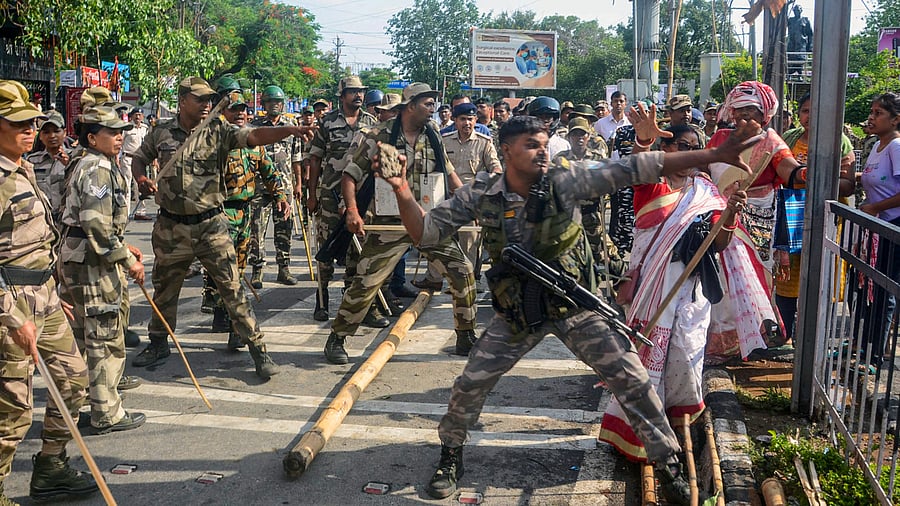
Police personnel try to disperse agitators blocking a road during 'Jharkhand bandh', called to protest against the construction of a ramp near Sarna Sthal, a sacred tribal religious site, in Ranchi, Wednesday, June 4, 2025.
Credit: PTI Photo
The Panchayats (Extension to Scheduled Areas) Act or PESA is one of the most radical pieces of legislation in independent India for tribal empowerment. Passed in 1996 to redress a historical injustice, PESA was supposed to extend self-rule to Adivasis, and give them ownership of their land, forests, water, and determine how their villages are run.
Two-and-a-half decades later, in Jharkhand, a state formed on a promise of Adivasi empowerment, PESA is mostly on paper. Despite the Centre's direction, states were slow to implement PESA. In 1999, Rajasthan was the first to amend its laws. Himachal Pradesh and Andhra Pradesh followed in 2011, Gujarat in 2017, and Madhya Pradesh and Chhattisgarh in 2022. Jharkhand and Odisha have yet to notify PESA rules.
Recent protests and demonstrations throughout Jharkhand have brought renewed focus to this ongoing debate. Community leaders, rights activists, and ordinary people have joined hands to demand their due since the formation of the state in 2000 — real autonomy through the complete implementation of PESA.
The failure to disseminate PESA equally has a sociological meaning as one of cultural and juridical marginalisation and invisibilisation, and of erosion of indigenous knowledge systems in the modern governance system.
At the core of the issue is a combative decision by the state to frame PESA rules under the Jharkhand Panchayati Raj Act, 2001 (JPRA) — and not PESA itself. Activists advocate that this violates the Constitution. In particular, the JPRA does not apply to municipalities, even in a scheduled area. The rules framed under this law would leave tribal towns like Ranchi or Jamshedpur out of its ambit, and in effect resonating out PESA’s coverage, by simply retitling what it deemed to be an ‘urban area’. This is an example of spatial exclusion.
The Bhuria Committee (1994), which paved the way for PESA, rightly believed that imposed development from above would alienate tribal communities. Development had to be participatory, locally owned, and culturally and ecologically respectful.
Perhaps the most debated feature of the JPRA is its invocation of the state’s land acquisition law whose provisions challenge the authority of the gram sabhas. The rules permit land acquisition with the consent of only one-third of the members of the gram sabha, and even waive the quorum requirement in subsequent meetings.
It has taken so long for Jharkhand to merely frame and notify the rules to implement PESA. This is appalling, especially since Jharkhand’s Scheduled Tribe population is 26.2%, consisting of 32 tribes. This is not in the interest of the tribals, and if the Jharkhand government is serious about a participatory democracy, the identity of the tribals, and constitutionalism, it cannot afford such a delay.
Since Jharkhand was carved out of Bihar with a mandate to uphold tribal interest and tribal autonomy, it has a special obligation to show its sensitivity to PESA. With a high ST population and strong traditions of self-governance among the Santhal, Munda, Oraon, Ho, etc, Jharkhand would have been an exemplar national PESA case for other states to follow.
The most important aspect of PESA is the validation of collective rights to jal (water), jangal (forest), and zameen (land). But these are rights that are becoming more and more meaningless because of commercialised legal regimes, speculative and commercial land transfers, and mining industries. It's not simply the loss of collective rights, but of social and culture capital, breaking apart of community bonds, and indigenous ecological knowledge.
Regardless of the political dispensation in power, it is high time Jharkhand acted with urgency. PESA must not be reduced to a ceremonial statute. Its principles must be embedded into local governance structures, planning processes, validation of customary tribal laws, and resource management systems. This requires legal reform, administrative training, and above all, political courage.
The promise of PESA was not just to protect land and forests. It was to restore voice and agency to India’s most historically marginalised citizens. It is not merely about administrative decentralisation, but about recognising and respecting the unique social, cultural, and political identity of Adivasi communities, enabling them to determine their own development pathways and manage their resources in accordance with their traditions.
The people of Jharkhand deserve nothing less.
(Jisu Ketan Pattanaik is assistant professor of Sociology, and Sumit Kumar Singh is research assistant and student, at the National University of Study and Research in Law, Ranchi.)
Disclaimer: The views expressed above are the authors' own. They do not necessarily reflect the views of DH.